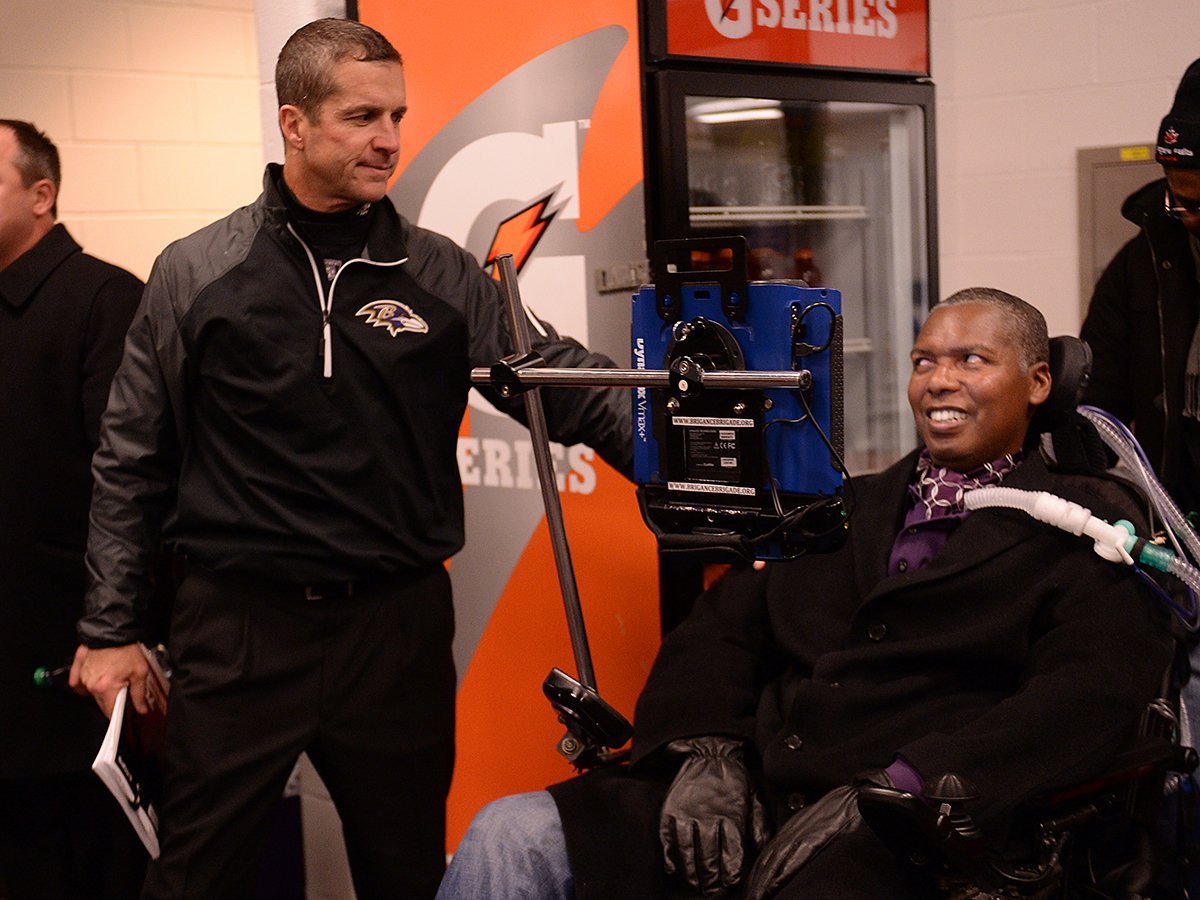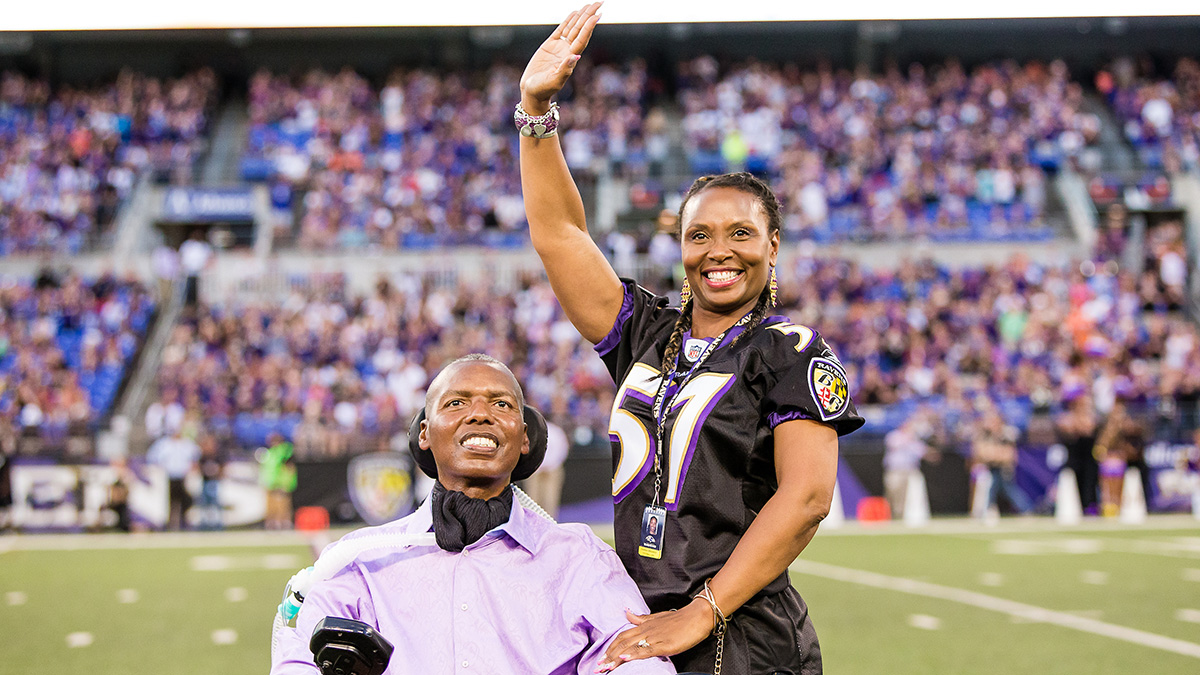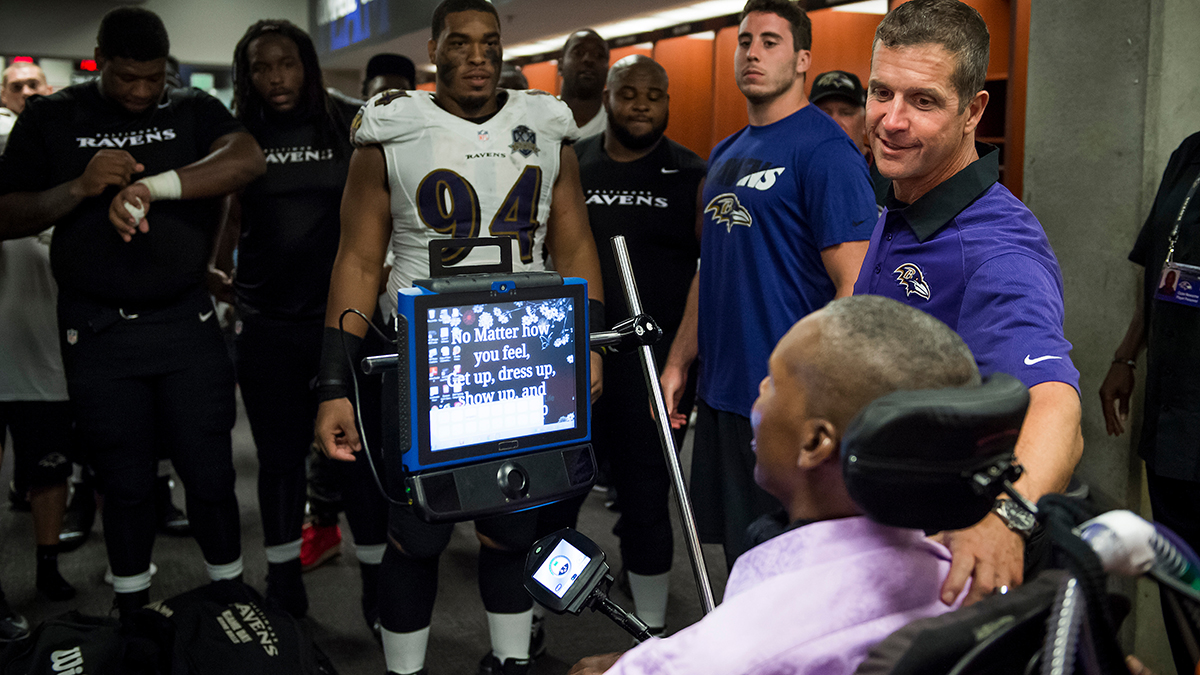ALS may slow, but not stop O.J. Brigance

Early on the morning of May 9, O.J. Brigance tweeted a quote from 19th century fiction writer Eliza Tabor Stephenson. It read: “Disappointment to a noble soul is what cold water is to burning metal; it strengthens, tempers, intensifies, but never destroys it.”
Disappointment was one of many emotions Brigance experienced on May 16, 2007. That was the day he was diagnosed with Amyotrophic Lateral Sclerosis, commonly known as Lou Gehrig’s Disease. He was 37. Weakness in his right arm while playing racquetball prompted him to see a physician. Several tests led to the diagnosis. Less than a year later, Brigance was in a wheelchair.
Disappointment to a noble soul is what cold water is to burning metal; it strengthens, tempers, intensifies, but never destroys it.
~Eliza Tabor~— O.J. Brigance (@OJBrigance) May 9, 2018
Brigance, who played 13 seasons of professional football, continues to defy the odds of living with an incurable disease that afflicts more than 5,600 Americans per year. On average, the prognosis is two to five years, and only about 20 percent of those diagnosed each year will live five years. No more than 10 percent are expected to live as many as 10 years after being diagnosed.
“When I was first diagnosed with ALS, once I got past the initial shock, I was determined to beat this dreadful disease,” Brigance said in an email. “The most important thing I told myself was that God hadn’t brought me this far in life to leave me to death.”
The neurodegenerative disease, which rapidly attacks nerve cells in the brain and spinal cord, has rendered Brigance unable to voluntary control his muscles. He is now able to move only his eyes. But his condition has not destroyed him. Far from it.
Each and every day, Brigance awakes with vigor and a determination to not allow the disease to dictate his fate. Not when he has much work to do as the Baltimore Ravens’ senior adviser to player engagement and as an ALS ambassador through his Brigance Brigade Foundation, co-founded with his wife, Chanda.

“I believe that life’s challenges serve as preparation for greater challenges down the road of life,” said O.J. Brigance, who was a linebacker for six seasons in the Canadian Football League and seven in the National Football League before joining the Ravens’ player development department after retiring as a player in 2002.
Though confined to a motorized wheelchair that has many features similar to those of a recliner, he is able to get around in almost any setting. He goes about his day’s work in a manner consistent with millions of Americans. That is to say he spends a great deal of time crafting, sending and sifting through emails, texts and calls. The difference is he navigates his communication device through built-in eye-tracking technology that allows his words, sentences and paragraphs to come to life.
“Continued technological advancements are critical in allowing me to interact in the workplace,” said Brigance, a Houston native who attended Rice University and received a degree in managerial studies. “Being able to communicate through my device keeps me engaged. I am able to work pretty much all of the computer applications with my device as well as send texts and make phone calls.”
Brigance is able to do so with a Tobii Dynavox computer with eye-recognition software. Two infrared lights calibrate to his pupils, which allows him to choose a letter by staring at it. The process is repeated until a word is formed. Much like texting with a smartphone, stringing a couple of letters together yields a choice of words to choose from. Brigance has several preprogrammed words, phrases and sentences. He can text, email or have the device vocalize his words through a “speak” option.
“When he starts up his device it looks just like you and I are sitting in front of our laptop,” said Amanda Mummert, who serves as director of the Brigance Brigade Foundation. “Through that he can search the internet, text, send emails and make phone calls. He is able to make phone calls by typing (through) a device that vocalizes for him.”
Through such technology, individuals afflicted with ALS or other diseases and injuries that prevent standard use of laptops and similar devices can remain engaged.
[beauty_quote quote='“These devices allow you to not only continue to work and have a sense of purpose they also, even more importantly, allow someone to have a sense of safety." - Amanda Mummert, director of the Brigance Brigade Foundation']
“Twenty years ago (Brigance) would never have been able to hold the job that he holds now,” said Dr. Anikar Chhabra, an orthopedic surgeon at the Mayo Clinic in Phoenix. “(Technological advances) give people like him a better quality of life. I don’t know if it will change the progression of the disease, but these advances give people who have this disease some hope that they can have some form of communication skills that make them more functional in society.”
Such devices also provide a layer of security for the user who otherwise might not to be able to communicate.
“These devices allow you to not only continue to work and have a sense of purpose they also, even more importantly, allow someone to have a sense of safety,” Mummert said. “Imagine if you need something and you can’t breathe or eat on your own and you are unable to make a sound. These devices really give you a voice. They give you a chance to tell people what you need.”
Brigance, who at work and home is able to operate fax machines, televisions and the like thanks to their operating systems having been calibrated into his devices, is constantly communicating. He is in the office five days a week, frequently on the practice field and at the stadium on game days. It is where he wants to be, and the daily regimen keeps he connected, the importance of which cannot be understated.
“He is always talking to the players and pouring into them the wisdom and knowledge that he obtained from his years as a player in the league,” said Chanda Brigance. “He is in the office every day and speaks to the team prior to games. He has not missed a beat. He is always there in the office and the locker room speaking to the players. It gives him a reason and a purpose to continue to be a part of life. That is needed for anyone who is in a place such as the one O.J. is in.”
In his role with the Ravens, Brigance, who requires a ventilator to breathe and has a feeding tube, often dishes out words of wisdom. A remarkably upbeat individual, he interjects a sense of positivity when it comes to counseling team members. For example, instead of the players beating themselves up over a tough loss or being dragged down by something that is not going well off the field, Brigance offers both words and an example that they should keep their heads up and look forward to scaling hurdles.

“I try to help the men realize a higher perspective of the situation they are facing,” Brigance said. “The intestinal fortitude that drove them to be professional athletes, overcoming various socioeconomic barriers, is the same fight that will push them over the current obstacle they may be facing. We are all mentally stronger than we often give ourselves credit for. Realizing how blessed to be living another day can be the best impetus to embrace any challenge life sends our way.”
Perception of people in wheelchairs, whether through ALS or some other debilitating means, often is that they cannot be helpful or productive. The Ravens make it imperative that when players join the team, especially rookies, they get to know Brigance.
[beauty_quote quote='"The intestinal fortitude that drove them to be professional athletes, overcoming various socioeconomic barriers, is the same fight that will push them over the current obstacle they may be facing. We are all mentally stronger than we often give ourselves credit for. Realizing how blessed to be living another day can be the best impetus to embrace any challenge life sends our way." - O.J. Brigance']
“When rookies come in (coach John Harbaugh) makes it a point that they get to know O.J.,” said Chanda Brigance. “Because, you know, don’t let what you see push you away from him. If anything, let what you see pull you closer to him because he still has that wisdom and he still has that knowledge whether it is football or life circumstances that they can learn from him. For the rookies that join the team, they are experiencing something new in life. They are learning that in the case of somebody like O.J. the mind is still sharp and there is a determination and will of wanting to still be a part of something.”
Among the challenges the medical field faces every day is finding a cure for ALS, which was first identified in 1869 by French neurologist Jean-Martin Charcot. It entered the American public consciousness during Lou Gehrig Appreciation Day on July 4, 1939, two weeks after the Yankees and Hall of Fame first baseman was diagnosed. He died in June 1941.
“It’s a scary disease because there is no cure, and there are so many questions rather than answers,” Chabbra said. “The average lifespan after being diagnosed is less than five years. I couldn’t even fathom how strong-willed and patient these people must be because simple everyday things are nearly impossible for them.”
Strong-willed and patient might best describe Brigance. While ALS has taken over his body, he can still control his mind and that means making the best of every waking moment.
“I have come to realize that ALS is a disease that teaches great patience,” he said. “When you are originally diagnosed, you want an immediate solution. Unfortunately, this is one of those diseases that is difficult to predict as far as the cause and the cure. I know that researchers are working diligently to find a solution, so that is reason for optimism. It may or may not be during my lifetime, but I am intent on making the best of every day regardless of the obstacles that ALS may present!”


